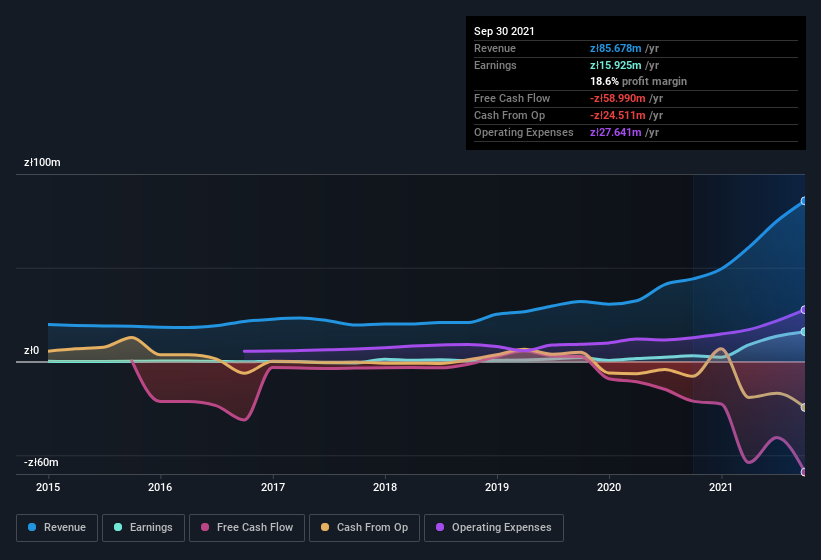Shareholders Shouldn’t Be Too Comfortable With Hub.Tech's (WSE:HUB) Strong Earnings
Despite posting strong earnings, Hub.Tech SA's (WSE:HUB) stock didn't move much over the last week. We think that investors might be worried about the foundations the earnings are built on.
See our latest analysis for Hub.Tech

Examining Cashflow Against Hub.Tech's Earnings
In high finance, the key ratio used to measure how well a company converts reported profits into free cash flow (FCF) is the accrual ratio (from cashflow). To get the accrual ratio we first subtract FCF from profit for a period, and then divide that number by the average operating assets for the period. This ratio tells us how much of a company's profit is not backed by free cashflow.
As a result, a negative accrual ratio is a positive for the company, and a positive accrual ratio is a negative. While it's not a problem to have a positive accrual ratio, indicating a certain level of non-cash profits, a high accrual ratio is arguably a bad thing, because it indicates paper profits are not matched by cash flow. That's because some academic studies have suggested that high accruals ratios tend to lead to lower profit or less profit growth.
Over the twelve months to September 2021, Hub.Tech recorded an accrual ratio of 0.59. As a general rule, that bodes poorly for future profitability. And indeed, during the period the company didn't produce any free cash flow whatsoever. Over the last year it actually had negative free cash flow of zł59m, in contrast to the aforementioned profit of zł15.9m. Coming off the back of negative free cash flow last year, we imagine some shareholders might wonder if its cash burn of zł59m, this year, indicates high risk. Unfortunately for shareholders, the company has also been issuing new shares, diluting their share of future earnings.
Note: we always recommend investors check balance sheet strength. Click here to be taken to our balance sheet analysis of Hub.Tech.
In order to understand the potential for per share returns, it is essential to consider how much a company is diluting shareholders. As it happens, Hub.Tech issued 47% more new shares over the last year. That means its earnings are split among a greater number of shares. To talk about net income, without noticing earnings per share, is to be distracted by the big numbers while ignoring the smaller numbers that talk to per share value. Check out Hub.Tech's historical EPS growth by clicking on this link.
How Is Dilution Impacting Hub.Tech's Earnings Per Share? (EPS)
Hub.Tech has improved its profit over the last three years, with an annualized gain of 3,191% in that time. But EPS was only up 1,586% per year, in the exact same period. And at a glance the 430% gain in profit over the last year impresses. But in comparison, EPS only increased by 260% over the same period. So you can see that the dilution has had a fairly significant impact on shareholders.
In the long term, earnings per share growth should beget share price growth. So it will certainly be a positive for shareholders if Hub.Tech can grow EPS persistently. However, if its profit increases while its earnings per share stay flat (or even fall) then shareholders might not see much benefit. For that reason, you could say that EPS is more important that net income in the long run, assuming the goal is to assess whether a company's share price might grow.
Our Take On Hub.Tech's Profit Performance
As it turns out, Hub.Tech couldn't match its profit with cashflow and its dilution means that earnings per share growth is lagging net income growth. For the reasons mentioned above, we think that a perfunctory glance at Hub.Tech's statutory profits might make it look better than it really is on an underlying level. In light of this, if you'd like to do more analysis on the company, it's vital to be informed of the risks involved. For instance, we've identified 4 warning signs for Hub.Tech (1 doesn't sit too well with us) you should be familiar with.
Our examination of Hub.Tech has focussed on certain factors that can make its earnings look better than they are. And, on that basis, we are somewhat skeptical. But there is always more to discover if you are capable of focussing your mind on minutiae. Some people consider a high return on equity to be a good sign of a quality business. So you may wish to see this free collection of companies boasting high return on equity, or this list of stocks that insiders are buying.
Valuation is complex, but we're here to simplify it.
Discover if Hub.Tech might be undervalued or overvalued with our detailed analysis, featuring fair value estimates, potential risks, dividends, insider trades, and its financial condition.
Access Free AnalysisThis article by Simply Wall St is general in nature. We provide commentary based on historical data and analyst forecasts only using an unbiased methodology and our articles are not intended to be financial advice. It does not constitute a recommendation to buy or sell any stock, and does not take account of your objectives, or your financial situation. We aim to bring you long-term focused analysis driven by fundamental data. Note that our analysis may not factor in the latest price-sensitive company announcements or qualitative material. Simply Wall St has no position in any stocks mentioned.
Have feedback on this article? Concerned about the content? Get in touch with us directly. Alternatively, email editorial-team (at) simplywallst.com.
About WSE:HUB
Flawless balance sheet and good value.
Market Insights
Community Narratives



